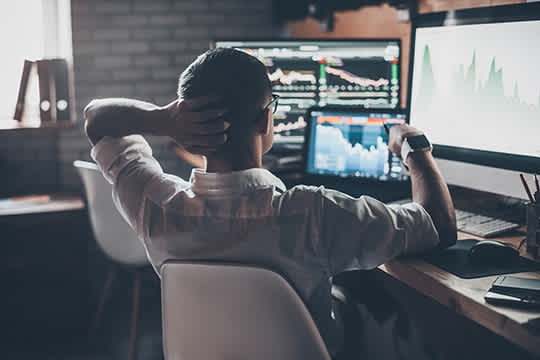The impact of luck on investments
Keytrade Bank
keytradebank.be
November 26, 2019
4 minutes to read
When investing, you usually have a specific goal in mind as well as a strategy. But you need a little bit of luck, too.
If you made investments in the S&P 500 on 9 March 2009, you're one lucky person indeed. 9 March 2009 is the date on which the major American index fell to its lowest point since the start of the 2008 crisis. Although it's seen several dips, the index has since been on an upward trend for 10 years. Knowledge, discipline, insight, hard work, analytical skills, a somewhat rebellious outlook – these are all characteristics that we associate with success when it comes to investing. But to what extent does 'luck' actually play a role (such as investing in the S&P 500 on the fateful day of 9 March 2009)?
"Whether it's sport, running a business or investing, you can't avoid the fact that both skill and luck contribute to success", says Marc De Ceuster, Professor of Financial Economy at the University of Antwerp. "If you have a yardstick with a game of chance, such as roulette, at one end, and a game of skill, such as chess, at the other, investing is somewhere in the middle."
"Furthermore, investing is something you do for the long term, and movements on the stock markets are not easy to predict", he continues. "Due to the markets' unpredictable nature, luck undoubtedly plays its part when it comes to investments."
Everyone is the world's best driver
Yet there are a number of other factors that show that luck has a significant impact on whether investments are a success or not on the stock market. "Investors usually attribute a good result to their own abilities or tend to overestimate their role in a particular outcome. You can see the overconfidence effect when you're on the road, too. Most drivers believe they are better than average, while statistics show that only half are above average when behind the wheel. The same applies to investing. When people make estimates, they tend to overestimate their skills and the potential returns, and underestimate the risks. Successful results are put down to their own expertise, while losses are minimised or the stock market's 'fault'. In practice, however, it's simply 'luck' that largely determines whether an investment comes off or not."
The same applies to the way in which we estimate chance. "Imagine that you're on a bus with forty people (without twins on board). How big a chance is there that two people share the same birthday? Most people will estimate the chance to be very low. But what we're forgetting is that we can compare each individual traveller to everyone else on the bus. In reality, that gives us an 89% chance that two people on the bus share the same birthday", says Marc De Ceuster. "The same applies to investments. We think we're good at estimating the chances, when often we are wrong. Here, too, it's simply 'luck' that largely determines whether an investment comes off or not."
Two strategies
If we invest in funds or through an asset manager, we pay a fee for the manager's skills – not for their chances of having some luck and some windfalls. "Here, too, it's also very difficult to say whether managers are successful due to luck or thanks to their skills", continues Marc De Ceuster. "Ultimately, taking 'luck' out of the equation lies at the heart of an investment analysis. In that respect, investing is extremely interesting as it's hard to build a portfolio that significantly outperforms the benchmark. On other hand, it's also quite hard to build a portfolio that does significantly worse than the benchmark."
It seems clear that you'll never be able to have luck completely on your side. Yet Professor Marc De Ceuster has two strategies that you can easily put into play to help you take being lucky (or unlucky) out of the equation:
- Diversification. Spread your investments over various asset classes (shares, bonds, etc.), sectors, themes, geographical regions and over time
- Discipline. Investing is a marathon, not a sprint. Constantly buying and selling or following your gut feeling often do not end well. Opting for funds or portfolio management can therefore provide significant added value, as professional managers can offer a personal touch and are less likely to be captivated by emotions on the markets.

